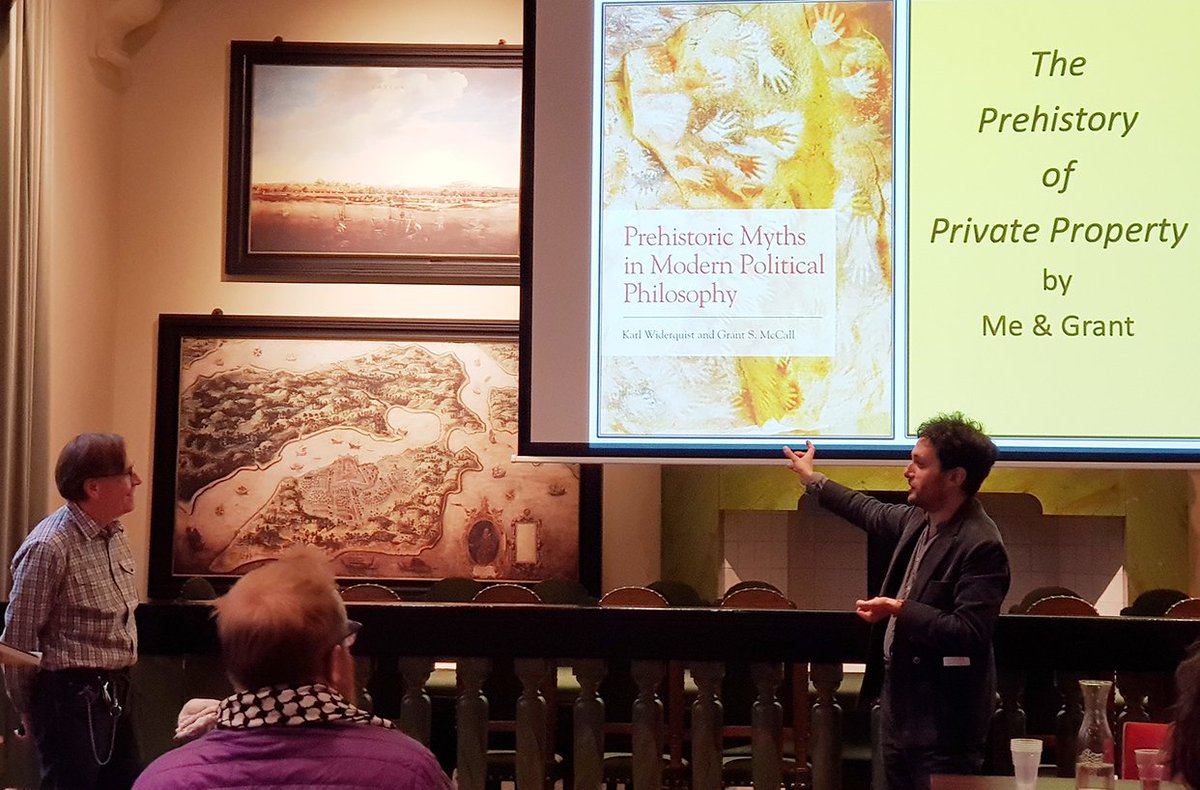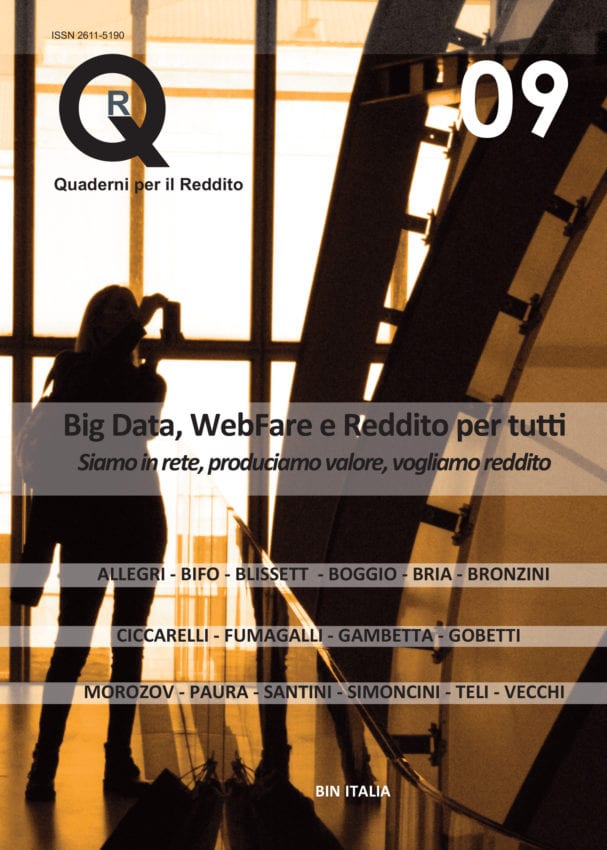by Karl Widerquist | Jul 22, 2019 | Opinion, The Indepentarian
The following is an extended excerpt from, “The Future of Work: Universal Basic Income and the Philosophy of Freedom,” by Romany Williams, SSENSE.
The rhetoric that increased entrepreneurship equals a utopian society is one-sided. What about equality as a means for liberation from these systemic ideals?
“UBI is voluntary participation capitalism. What we have now is mandatory participation capitalism. I believe this model of mandatory participation capitalism is an affront to a free society,” says Karl Widerquist, Associate Professor of political philosophy at SFS-Qatar at Georgetown University and author of Independence, Propertylessness, and Basic Income: A Theory of Freedom as the Power to Say No. “Capitalism is based on people who own all the resources, and other people who can only use those resources if they take a subordinate position. Most of us will have no choice but to participate in the capitalist system, not as a capitalist, but as a worker for years. Basic income gives you the power to say no to that. To say, ‘I work because I want to, not because you threaten me with homelessness and starvation.’”
“The potential for robotics to give us more leisure is incredible if we’re allowed to take it. But most of us can’t demand that. If we don’t work 40 hours a week, 50 weeks a year, we don’t have any income,” says Widerquist. “We should all receive some of the benefits of automation. If you’ve had a job anytime in the last 40 years, you’ve done something to further the great economic growth we’ve had.”
Chronic economic insecurity is toxic and a sense of freedom doesn’t come from an Instagram feed filled with pictures of nature. Nor does it come from endlessly climbing the corporate ladder. The scarcity mindset that is perpetuated by the lack of proper compensation and workers’ rights only worsens mental health issues, making for an increasingly volatile social and political climate. History proves that the only way to change things is to mobilize. “Remember the 1% is only 1% of the people,” says Widerquist. “We have the other 99%.”
The author of the article excerpted here is Romany Williams, a stylist and associate editor at the fashion magazine, SSENSE, (pronounced “S-sense” or “essence”). I never expected to be interviewed for a fashion magazine, but he did an amazing job giving my ideas context and letting me speak for myself—for good or bad. I’d edit it slightly if I could.
The full text of the article is online: “The Future of Work: Universal Basic Income and the Philosophy of Freedom,” by Romany Williams, SSENSE


by Karl Widerquist | Jun 9, 2019 | Opinion, The Indepentarian
My latest book project (coauthored by the anthropologist, Grant S. McCall) is called The Prehistory of Private Property. It book tells two parallel histories. It tells the story of how modern property theory became dependent on three misconceptions about the origin of the property rights system and the difference between societies with common and privatized resources, and how those misconceptions continue to have a negative effect on contemporary political thought and beliefs about our shared responsibility. The second story traces the origin and development of the private property system through history and prehistory to debunk those misconceptions.
The three claims at the center of this book are: 1. The normative principles of appropriation and voluntary transfer applied in the world we live in can only support a capitalist system with strong private property rights. 2. Capitalism is more consistent with negative freedom than any other conceivable economic system. 3. Inequality is natural and inevitable, or egalitarianism is unsustainable without a significant loss in freedom.
The book devotes a great deal of space to show how these misconceptions are embedded in many influential theories in political philosophy, because political philosophers are often unclear about the extent to which their theories rely on empirical claims. The clarity problem is nearly as important as the dubious nature of the claims. Obscurity and ambiguity help shield these claims from scrutiny.
Underlying this specific theoretical agenda is the more general goal of raising the level of discussion of empirical issues in political philosophy. Ambiguous allusions to empirical claims should be unacceptable in any academic literature. Philosophers have the responsibility to be clear about what empirical claims they rely on and about the level of support they can offer for those claims. Their critics should not let them get away with the sloppy use of ambiguous allusions to empirical claims.
Once the need for each claim is clearly established, the book subjects each claim to rigorous empirical investigation using the best evidence available from anthropology, and then discusses the implications of those findings for contemporary theory. Some of the book’s central findings follow.
- The normative principles of appropriation and transfer much more easily support common or collective claims to property. Private property rights systems tend not to develop without state aggression against small-scale societies with better claims of a connection to “original appropriation” than people establishing individualist private property rights.
- The hunter-gatherer band economy is more consistent with negative freedom than any other form of socio-political organization known to anthropology. If freedom is an overriding value, everyone must become a nomadic hunter-gatherer. This finding implies both that the justification of any other system must rely at least partially on some other value such as opportunity and that aid to the disadvantaged is not necessarily freedom-reducing: it often counteracts freedom-reducing aspects of private property.
- Inequality is not natural nor inevitable nor in conflict with freedom. Contemporary egalitarian theory can benefit from the experience of small-scale societies that successfully maintain very high levels of political, social, and economic equality.
The book is not directly about Basic Income, but it will connect to the idea in the final chapter. We will argue that the mass of humanity lead lives of manufactured desperation. People are not naturally in a struggle to “find work” to ensure they have food, shelter, and clothing. They are artificially put in this situation by a stratified property rights system that is not necessary for human social organization and that most societies (from the earliest hunter-gatherers to more recent peasant farming systems) did not find it necessary to manufacture such desperation. Basic Income is one way to compensate people for the imposition of a stratified property system and to relieve them of desperation that has come with it.
We have full drafts of 8 of the books ten chapters, and we are positing them online at this link as they reach presentable form. We hope to have a full draft we can send to our publisher (Edinburgh University Press) within a few weeks or months.

Enzo grills Karl at the PPA+ conference, Amsterdam, 2019

by Andre Coelho | Jun 8, 2019 | News
Louise Haagh, presently Reader at the University of York, and Chair of the Basic Income Earth Network (BIEN), just released a new book, through Polity: The case for Universal Basic Income. A summary is featured on the editor’s page:
Advocated (and attacked) by commentators across the political spectrum, paying every citizen a basic income regardless of their circumstances sounds utopian. However, as our economies are transformed and welfare states feel the strain, it has become a hotly debated issue.
In this compelling book, Louise Haagh, one of the world’s leading experts on basic income, argues that Universal Basic Income is essential to freedom, human development and democracy in the twenty-first century. She shows that, far from being a silver bullet that will transform or replace capitalism, or a sticking plaster that will extend it, it is a crucial element in a much broader task of constructing a democratic society that will promote social equality and humanist justice. She uses her unrivalled knowledge of the existing research to unearth key issues in design and implementation in a range of different contexts across the globe, highlighting the potential and pitfalls at a time of crisis in governing and public austerity.
This book will be essential reading for anyone who wants to get beyond the hype and properly understand one of the most important issues facing politics, economics and social policy today.

Louise Haagh will be featured in several events and talks in the next few months, given this recent publication. These include Nuffield College, University of Oxford, Institute for Public Policy Research, University of Bath, BIEN Ireland, BIEN Congress in India, BIEN-RSA Civic Forum in Scotland, and at a range of local venues in the United Kingdom, for instance the Citizens’ Advice Bureau, Café Economique, and North Yorkshire Humanists, as well as internationally at the World Health Organisation‘s (WHO) High-level Conference on Health Equity in the WHO European Region, to be held in Slovenia.
More details can be found in an online Appendix.

by Guest Contributor | Apr 16, 2019 | Opinion
Universal Basic Income (UBI) is once again in the news as a promising program in the upcoming general election in India after finding its place in India’s 2016-17 economic survey. Proponents say UBI is economically prudent and could make a significant dent on poverty in the country. UBI bypasses India’s weak system of existing welfare schemes which are riddled with misallocation, leakages, and exclusion of the poor. It also makes sense from the perspective of an individual, who is assumed to be economically rational and thus can spend in accordance to his priorities and choices.
Having said there is insufficient empirical evidence to demonstrate how UBI could accomplish social justice and poverty reduction, especially in a country like India which is still held down by a regressive social structure in the form of a caste system. The caste system leads to a lack of mobility, producing a semi-feudal system of land ownership. Land is held by a small fraction of the population with the rest being landless or having little property, especially in rural areas. The fact that most of the poor are also concentrated in India’s rural areas makes the case that UBI could be successful at alleviating poverty.
Moreover, the proposition that UBI will reduce poverty assumes that the market works competitively and allocates resources efficiently. However, markets do fail in providing an efficient and just outcome in the presence of informational asymmetry, externalities, and monopolies. This is especially true in the case of India where the market is disproportionately in the hands of a few big players who can influence it to their advantage. For instance, giving out cash as opposed to goods and services in kind may not help in remote places if the corresponding supply of essential goods are not there (this role is otherwise performed by the public distribution system in India which may be dismantled to make fiscal space for UBI). A monopoly supplier may hike the prices to neutralise the extra income. To the extent the purchasing power of cash transfers in the form of UBI is curtailed by market fluctuations, the efficacy of basic income to alleviate poverty could be limited.
UBI even in the presence of efficient market can capture only poverty in terms of economic deprivation, whereas factors such as poor health, lack of education, discrimination and lack of entitlements cannot be addressed by the market but are crucial from the perspective of eradicating poverty.
John Rawls in his seminal work propounding the concept of distributive justice is guided by the ‘difference principle,’ which stresses that goods and services should be arranged in a manner that serves to benefit the least advantaged and foster growth towards equality of opportunity. To the extent that everyone will receive the same amount of cash transfer irrespective of his or her requirement, the UBI fails to ensure distributional justice, in accordance with the ‘difference principle’. In this case, justice would require maximizing assistance to those who need it most, which at present our welfare schemes (despite its weaknesses) strives to achieve. UBI at best can only work in conjunction with the existing policies. In order to fully eradicate poverty, the welfare state should work towards increasing its capacity to deliver and regulate rather than leaving it to the market.
Rishi Kant
Currently pursuing Master’s in public administration (MPA), LKY school, National University of Singapore. Graduated in Economics from Delhi University and Post Graduated in Economics from Jawaharlal Nehru University. 5year experience of teaching in various colleges of Delhi University and working with the government of India under various capacities. He has worked as a researcher in the field of Labour economics and evaluated major labour market policies in India such as the Mahatma Gandhi National Employment Program. He has also part of capacity development programs organised by IMF in the areas of Macro-Economics, Fiscal and monetary policies, and Financial Programming and policies.
References
Ackerman. B, et al (2006), ‘Redesigning distribution: basic income and stakeholder grants as cornerstones of an egalitarian capitalism’, The Real Utopias Project, Vol. V. London.
Khera. R (2016) ‘A Phased Approach Will Make a Basic Income Affordable for India’, The Wire.
Michel. H (2008), ‘Global Basic Income and its Contribution to Human Development and Fair Terms of Global Economic Co-Operation: A Political-Economic Outlook’, A Paper for the Congress of the Basic Income Earth Network, University College, Dublin, Ireland.
Pettit. P (2007), ‘Basic Income and the Republican Legacy’, Basic income studies, International Journal of Basic Income Research Vol. 2.
Porter. E (2016), ‘A Universal Basic Income Is a Poor Tool to Fight Poverty’, New York Times.
Standing. G (2002), ‘Beyond the New Paternalism: Basic Security as Equality’, London.
Standing. G (2015), ‘India’s experiment in basic income grants’, Global Dialogues, Vol. 5.
Taylor. T (2014), ‘Economics and Morality’, Finance & development, a quarterly publication of the international monetary fund, Volume 51.
Todaro, Smith (2015), ‘Introducing Economic Development: A Global Perspective’ Economic Development, 12th edition, chapter 1, Pg 20.
Tobin. J, et al (1967), ‘Is a negative income tax practical’? The Yale Law Journal.
Van. P (1995), ‘Real Freedom for All’, Oxford, Oxford University Press.
https://www.ft.com/content/100137b4-0cdf-11e8-bacb-2958fde95e5e
https://www.weforum.org/agenda/2017/03/can-universal-basic-income-actually-work
https://www.ideasforindia.in/topics/poverty-inequality/the-tale-and-maths-of-universal-basic-income.html
https://www.livemint.com/Opinion/WwFH79xl9Ypyb8Qk7f4yiL/Is-universal-basic-income-a-feasible-idea-in-India.html
https://www.iep.utm.edu/sen-cap/
https://hdr.undp.org/sites/default/files/2018_mpi_jahan_alkire.pdf
https://tannerlectures.utah.edu/_documents/a-to-z/s/sandel00.pdf
https://www.weforum.org/agenda/2017/03/can-universal-basic-income-actually-work
************************

by Sandro Gobetti | Apr 4, 2019 | News
Basic Income Network Italia (BIN Italia) has released a new editorial production. Titled “QR9 (Quaderni per il Reddito) – Notebooks for Income: Big Data, WebFare and basic income for all! We are on the net, we produce value, we want basic income“, it’s freely accessible over the Internet.
This publication (March 2019) features 16 authors, offering different perspectives thanks to an included variety of articles written by several italian and international authors.
As reported in the back cover: “Today the Capital expresses its value and lives within neurons and silicon and this evolution changes the relationship between Labor and Capital. Identifying a sort of WebFare Manifesto, could mean a new speech to claim an unconditional basic income, the fruit of our being connected to the network”.
QR9 Index:
Sandro Gobetti and Luca Santini, “We are connected. Basic income and WebFare for all
Andrea Boggio, Big Data & Digital Labor”
Benedetto Vecchi, “The basic income between technocapitalism and social fragmentation”
Roberto Ciccarelli, “Why unconditional basic income and self-determination is a political revolution”
Daniele Gambetta, “From the network to the social network: self-determining the discourse”
Francesca Bria and Evgeny Morozov, “Digital rebel cities claim a New Deal on data”
Stefano Simoncini, “Populist Machines. The challenge of basic income and technological sovereignty between local and transnational”
Maurizio Teli, “WebFare, digital identity and collective freedom”
Andrea Fumagalli, “Network value and basic income: from the WebFare to the commonfare”
Roberto Paura, “From basic income to Universal Basic Assets: a manifesto for equity in the 21st century”
Giuseppe Bronzini, “Social cooperation between the big data economy and basic income”
Giuseppe Allegri, “The great convergence for basic income in the digital age”
Franco Berardi Bifo, “Thinking about basic income in the horizon of collapse”
Luther Blissett, “WebFare: income for all and all platforms for users!”








